Understanding Different Types of Car Scratches and Repairs
A well-maintained, scratch-free car surface not only enhances the overall aesthetics but also plays a crucial role in preserving the vehicle's value and longevity. Every scratch, whether surface-level or deep, can gradually lead to more significant issues if left unattended. This is why ensuring your car's exterior remains in pristine condition is essential.
At Detailing Devils, we understand the significance of a flawless finish. Our comprehensive range of services caters not only to car enthusiasts but also to motorcycle owners. From meticulous bike and car detailing to cutting-edge coating services, we take pride in providing top-notch solutions that go beyond cosmetic enhancement. Additionally, our premium Paint Protection Film (PPF) options, including the innovative Dragon PPF, offer unparalleled defense against scratches, ensuring your vehicle maintains its showroom shine for years to come.

How to identify the type of scratch you have ?
The first step to repairing a car scratch is to identify the type of scratch you have. To do this, you can use your fingernail to catch the scratch. If your fingernail doesn't catch the scratch, it's a clear coat scratch. If your fingernail does catch the scratch, it's either a primer-level or deep-paint scratch.
To determine if the scratch is primer-level or deep-paint, you can look at the color of the exposed metal. If the exposed metal is silver or gray, it's a primer-level scratch. If the exposed metal is brown or rusty, it's a deep-paint scratch.
Once you've identified the type of scratch you have, you can follow the appropriate repair instructions below.
Types of Car Scratches
A. Surface Scratches
Surface scratches are minor abrasions that affect only the topmost layer of a car's paint. They are often caused by light contact with objects or debris, such as bushes, small rocks, and keys.
How to Identify Surface Scratches
Surface scratches are typically shallow and do not penetrate the clear coat. They are usually visible as thin, superficial lines on the paint's surface. You can confirm the shallowness of a scratch by running a fingernail across it. If your fingernail does not catch on the scratch, it is likely a surface scratch.
Importance of Timely Repair
It is important to address surface scratches promptly to prevent further degradation of the paint. If left untreated, these scratches can expose the underlying layers to environmental elements, such as UV rays, moisture, and road salts. Over time, this can lead to more extensive damage, such as rust and corrosion.
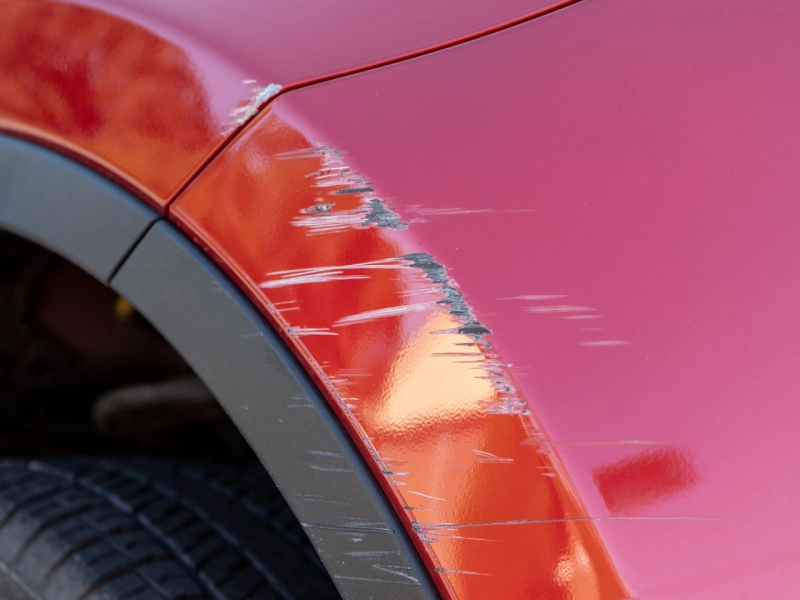
In addition, timely repair of surface scratches helps to maintain the vehicle's aesthetic appeal and resale value. Even minor scratches can make a car look worn and neglected, which can reduce its value to potential buyers.
How to Repair Surface Scratches
There are a few different ways to repair surface scratches, depending on the severity of the damage. For minor scratches, you may be able to buff them out using a rubbing compound or scratch remover. For deeper scratches, you may need to use touch-up paint.
If you are not comfortable repairing surface scratches yourself, you can take your car to a professional detailer or auto body shop.
Preventing Surface Scratches
There are a few things you can do to prevent surface scratches:
- Be careful when parking near bushes and trees.
- Avoid washing your car in direct sunlight.
- Use a soft sponge or microfiber cloth when washing your car.
- Apply a wax or sealant to your car's paint to protect it from scratches and other environmental damage.
B. Clear coat scratch
Clear coat is a transparent, protective layer that is applied over the base paint of a vehicle. It protects the paint from UV rays, environmental contaminants, and physical damage. Clear coat also gives the paint its gloss and depth. However, clear coat is not impervious to scratches.
Causes of Clear Coat Scratches
There are many different causes of clear coat scratches, including:
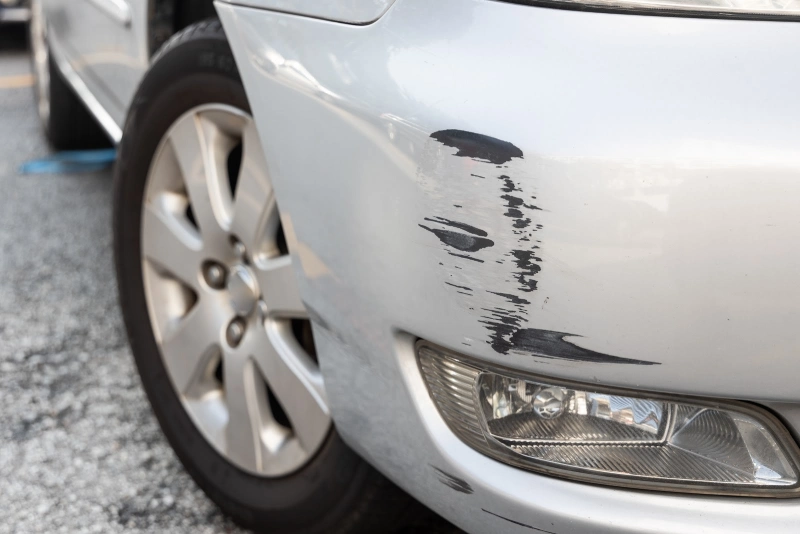
- Contact with rough surfaces: This could include brushing against a bush or tree branch, or accidentally scraping against a wall or curb.
- Abrasive materials: Using harsh chemicals or abrasive cleaning products can damage the clear coat.
- Improper cleaning techniques: Using coarse sponges or brushes, or washing the car without properly rinsing the soap away, can also lead to scratches.
- Airborne debris: Fine dust and sand can scratch the clear coat over time.
Repairing Clear Coat Scratches
Minor clear coat scratches can often be repaired at home using a rubbing compound. Rubbing compounds are abrasive compounds that can remove the damaged layer of clear coat, revealing the fresh, unscratched clear coat underneath.
To repair a clear coat scratch:
- 1. Wash and dry the area around the scratch.
- 2. Apply a small amount of rubbing compound to a soft cloth.
- 3. Rub the compound into the scratch in a circular motion.
- 4. Continue rubbing until the scratch is gone.
- 5. Rinse the area with water and dry with a clean cloth.
If the scratch is deep, it may be necessary to take the car to a professional detailer or auto body shop for repair.
Preventing Clear Coat Scratches
There are a few things you can do to prevent clear coat scratches:
- Wash your car regularly using a soft sponge or microfiber cloth and a mild car wash soap.
- Avoid using harsh chemicals or abrasive cleaners.
- Be careful when parking near bushes and trees.
- Apply a wax or sealant to the clear coat to protect it from UV rays and other environmental contaminants.
C. Deep Scratches
Deep scratches are more than just an eyesore. They can also compromise the integrity of your car's paint and lead to rust and corrosion. If you have a deep scratch on your car, it's important to get it repaired as soon as possible.
What Are Deep Scratches?
Deep scratches penetrate beyond the clear coat and reach the base coat or even the metal surface of the vehicle. They are typically caused by more significant impacts or contact with sharp objects.
Why Deep Scratches Matter
Deep scratches matter for two main reasons:
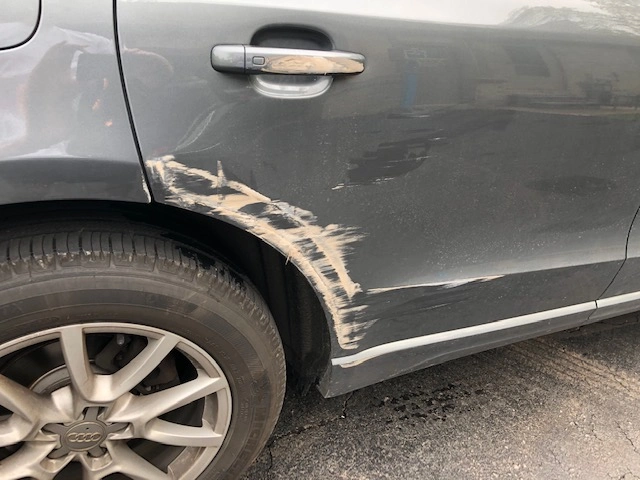
- They compromise the aesthetic appeal of the vehicle. A car with deep scratches will look worn and neglected, which can reduce its resale value.
- They expose the underlying layers to potential rust and corrosion. If left untreated, deep scratches can allow moisture and other corrosive elements to seep into the paint and metal, causing rust and corrosion.
How to Repair Deep Scratches
Repairing deep scratches is more challenging than repairing surface scratches. In most cases, it is best to take your car to a professional detailer or auto body shop.
Professional detailers have the specialized tools and techniques necessary to effectively repair deep scratches without damaging the surrounding paint. They will typically use a combination of sanding, priming, painting, and clear coat application to restore the paint to its original condition.
Preventing Deep Scratches
There are a few things you can do to prevent deep scratches:
- Be careful when parking near bushes and trees.
- Avoid washing your car in direct sunlight.
- Use a soft sponge or microfiber cloth when washing your car.
- Apply a wax or sealant to your car's paint to protect it from scratches and other environmental damage.
D. Paint Transfer Scratches
Paint transfer scratches occur when the paint from another object, such as another vehicle, rubs off onto the surface of your car. This can happen in a variety of situations, such as minor accidents, when parking too close to another vehicle, or even when brushing against a painted object.
While paint transfer scratches may not seem like a big deal at first, they can actually be quite damaging if left untreated. Over time, the transferred paint can start to eat away at the underlying clear coat, leaving your car's paint vulnerable to further damage. Additionally, paint transfer scratches can make your car look unsightly and reduce its resale value.
How to Remove Paint Transfer Scratches SafelyThere are a few different ways to remove paint transfer scratches, but it is important to do so carefully to avoid damaging the underlying paint. Here are a few tips:
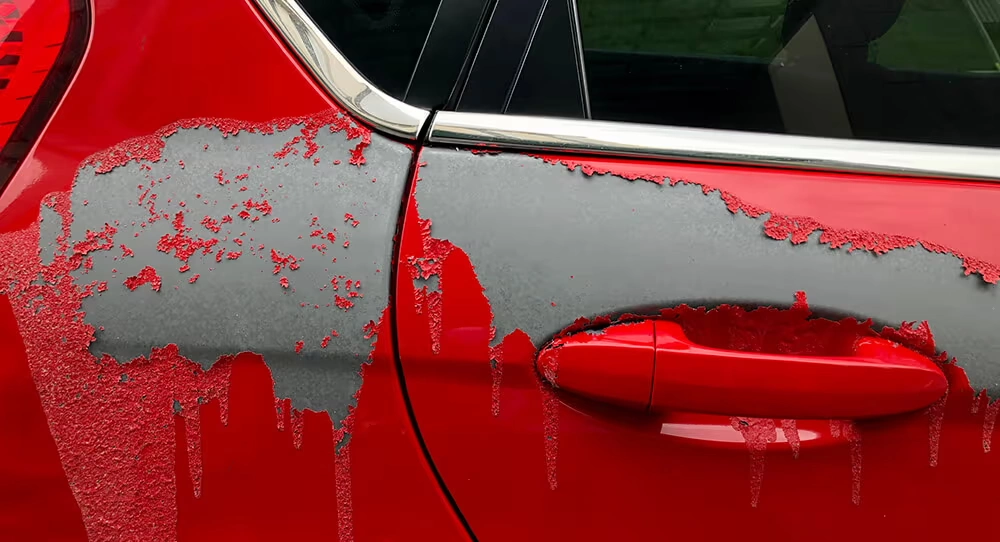
- Start with a mild solvent. A mild solvent, such as rubbing alcohol or acetone, can help to loosen the transferred paint. Apply a small amount of solvent to a soft cloth or sponge and gently rub it over the scratch. Be careful not to press too hard, as this could damage the paint.
- Use a specialized automotive detailing product. There are a number of specialized automotive detailing products that are specifically designed to remove paint transfer scratches. These products are typically more effective than mild solvents and are less likely to damage the paint.
- Be patient and gentle. It may take some time and effort to remove all of the transferred paint. Be patient and gentle, and avoid rubbing too hard.
Once you have removed the transferred paint, you should apply a wax or sealant to the affected area. This will help to restore the shine and protect the paint from future damage.
If the paint transfer is extensive or particularly stubborn, it may be best to seek professional assistance. A professional detailer will have the tools and expertise to safely and effectively remove the transferred paint without damaging the underlying paint.
Preventing Paint Transfer ScratchesThere are a few things you can do to prevent paint transfer scratches:
- Be careful when parking. Avoid parking too close to other vehicles or near painted objects.
- Use a car cover. A car cover can help to protect your car's paint from scratches, including paint transfer scratches.
- Get your car detailed regularly. A professional detailer can apply a wax or sealant to your car's paint, which will help to protect it from scratches and other damage.
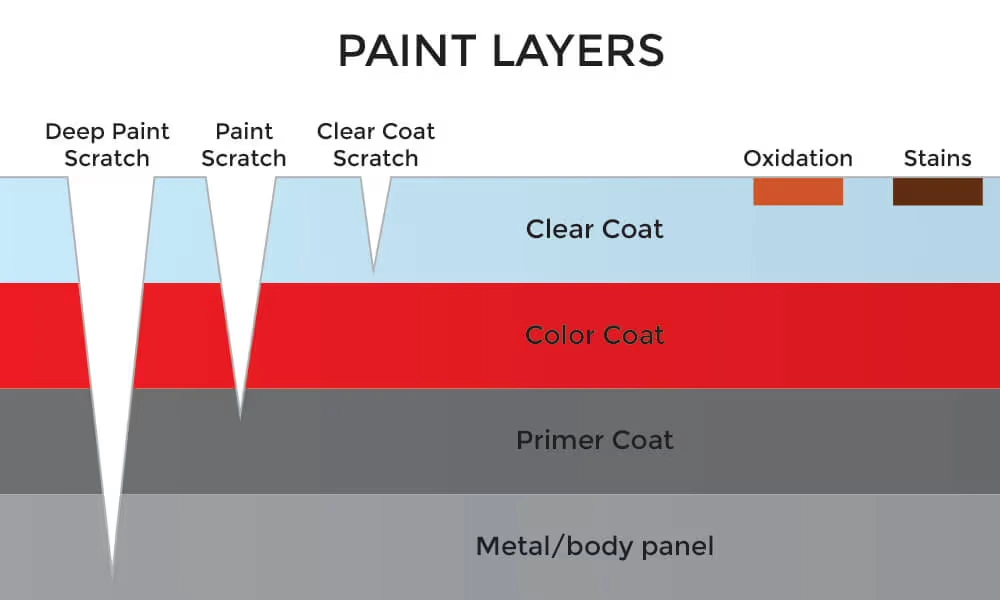
Repair Options for Car Scratches
DIY Solutions
When it comes to addressing car scratches, DIY solutions can be a convenient initial step. Scratch removal kits are readily available and can prove effective for minor surface imperfections. These kits typically include abrasives, compounds, and applicators designed to smooth out scratches. However, it's crucial to exercise caution during DIY scratch repairs.
Using excessive force or the wrong technique may lead to further damage. Additionally, DIY solutions have their limitations, particularly when dealing with deep or extensive scratches. In such cases, seeking professional assistance is recommended for a more comprehensive restoration.
Professional Detailing Services
Professional detailing services, such as those offered by Detailing Devils, provide a higher level of expertise and precision in scratch removal. The team at Detailing Devils is equipped with specialized techniques and tools tailored for different types of scratches. Whether it's surface scratches or more severe damage, our professionals have the knowledge and experience to restore your vehicle's finish to its optimal condition. Beyond scratch removal, their services encompass a comprehensive range of car detailing solutions, ensuring your vehicle receives the care and attention it deserves.
Coating Services
Coatings play a pivotal role in protecting your vehicle's surface from scratches and other forms of damage. Detailing Devils offers a selection of coatings, including ceramic, nano ceramic, and Paint Protection Film (PPF). These coatings form a durable barrier that shields the paint from environmental elements, ensuring a long-lasting, scratch-resistant finish. Ceramic coatings provide an extra layer of gloss and hydrophobic properties, making them a popular choice among car enthusiasts.
Dragon PPF
Detailing Devils introduces Dragon PPF, a cutting-edge solution for superior paint protection. This innovative PPF option boasts unique features that set it apart from conventional offerings. Dragon PPF provides enhanced clarity, self-healing properties, and increased durability, ensuring your vehicle remains shielded from scratches, stone chips, and other forms of damage.
Its advanced technology offers a level of protection that goes beyond what standard PPF options can provide, making it an exceptional choice for those seeking the highest level of scratch resistance and overall paint protection.
Estimated Average Costs for Scratch Repair
The average cost for scratch repair can vary based on several factors, including the type and severity of the scratch, the make and model of the vehicle, and the location of the repair shop. Here is a rough estimate:
- 1. Surface Scratches:
- o DIY kits: $10 - $50
- o Professional repair: $50 - $150
- 2. Clear Coat Scratches:
- o DIY repair: $20 - $100
- o Professional repair: $100 - $300
- 3. Deep Scratches:
- o Professional repair: $150 - $500 (or more for extensive damage)
- 4. Paint Transfer Scratches:
- o DIY removal: $10 - $50
- o Professional removal: $50 - $150
Please note that these are approximate costs and can vary based on various factors. For accurate pricing, it is recommended to obtain quotes from local auto body shops or professional detailers.
Conclusion
In conclusion, understanding the different types of car scratches and the available repair options is essential for maintaining the aesthetic appeal and value of your vehicle. Surface scratches, clear coat scratches, deep scratches, and paint transfer scratches each require specific approaches for effective restoration. Timely repair and the choice of the right method are crucial in preventing further damage.
Detailing Devils offers a comprehensive range of services, from DIY solutions and professional detailing services to advanced coating options like ceramic and nano ceramic coatings, as well as the revolutionary Dragon PPF. These offerings ensure that your vehicle receives the best care and protection against scratches and other forms of damage.
FAQs
While household items like toothpaste or baking soda may be suggested for scratch removal, they can sometimes do more harm than good. It's recommended to use dedicated automotive scratch removal products or seek professional assistance.
Ceramic coatings provide a layer of protection over the paint, while nano ceramic coatings utilize nano-sized particles for enhanced durability and gloss. Nano ceramic coatings offer superior performance and longevity.
Dragon PPF is designed to provide long-lasting protection, with durability extending up to 7 to 10 years or more, depending on factors like maintenance and environmental conditions.
In some cases, deep scratches can be effectively repaired using specialized techniques without the need for a full repaint. However, severe or extensive damage may require repainting.
While coatings like ceramic and PPF provide excellent protection against most types of scratches, they may not completely eliminate the risk. They significantly reduce the likelihood of scratches and offer a higher level of resistance compared to unprotected surfaces.
See Also :
- Best Car Cleaning Service in Noida - Find the best car cleaning services in Noida and keep your car looking new.
- Car Detailing Products - Discover the best products for car detailing and how to use them to achieve a professional shine.
- Detailing Services for Different Cars - Learn about the different types of detailing services available for different types of cars and which one is best for you.
- Car Detailing for Different Seasons - Find out how to prepare your car for different seasons with the right detailing methods and products.
- How to clean your car’s interior - Learn the 8 best techniques and products for cleaning the interior of your car, including the seats, dashboard, and carpets.
- How to clean car exterior in 6 easy steps - Discover the best ways to wash and protect the exterior of your car, including the paint, wheels, and windows.
- Detailing vs Washing - Understand the difference between detailing and washing and how to choose the right service for your car's needs.

